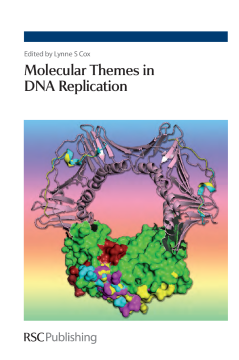
BOOK
Molecular Themes in DNA Replication
Stephen Kearsey | Judith L Campbell | Genevieve Almouzni | Joanna Poulton | Takehiro Yasukawa | Steve Bell | Ron Laskey | Tom Kunkel | James Chong | Xinquan Ge | Julian Blow | Christian Speck | Ginger Jiang | Ellen Fanning | Helle D Ulrich | Christian Haering | James Chong | Ji-Liang Li | Tracy Bryan | Alison Walters | Lynne S Cox
(2009)
Additional Information
Book Details
Abstract
DNA replication, the process of copying one double stranded DNA molecule to form two identical copies, is highly conserved at the mechanistic level across evolution. Interesting in its own right as a fascinating feat of biochemical regulation and coordination, DNA replication is at the heart of modern advances in molecular biology. An understanding of the process at both the biological and chemical level is essential to developing new techniques in molecular biology. Insights into the process at the molecular level provide opportunities to modulate and intervene in replication. Rapidly dividing cells need to replicate their DNA prior to division, and targeting components of the replication process is a potentially powerful strategy in cancer treatment. Conversely, ageing may be associated with loss of replication activity and restoring it to cells may moderate some of the diseases associated with old age. Replication is, therefore, fundamental to a huge range of molecular biological and biochemical applications, and provides many potential targets for drug design. The fast pace of replication research, particularly in providing new structural insights, has outdated the majority of available texts. This learned, yet accessible, book contains the latest research written by those conducting it. It examines conserved themes providing a biological background for biochemical, chemical and pharmaceutical studies of this huge and exciting field. Rather than simply "itemising" the replication steps and the proteins involved, replication is tackled from a novel perspective. The book provides logical groupings of processes based upon biochemical similarities. The emphasis on mechanisms and the relationship between structure and function targets the chapters towards biochemists and biological chemists as well as molecular and cell biologists. The book highlights new insights into the replication process, from the assembly of pre-replication complexes, through polymerisation mechanisms, to considering replication in the context of chromatin and chromosomes. It also covers mitochondrial DNA replication, and includes archaeal paradigms, which are proving increasingly relevant to the study of replication in higher eukaryotes. Exciting potential drug targets in DNA replication are discussed, particularly in the context of treating malaria and cancer.
Lynne S Cox has worked in the field of eukaryotic DNA replication since 1987. Within three years of gaining her PhD, she was awarded a Royal Society of Edinburgh personal research fellowship to conduct her own independent research. During this time, she also ran a CRC-funded project examining replication control through an essential protein PCNA. She then took up a Fellowship at Oriel College, Oxford and a University Lectureship in the Department of Biochemistry at Oxford. As well as studying human DNA replication in relation to cancer and senescence, her laboratory's work on malarial parasite replication factors more than doubled the number of characterized factors, with a view to developing inhibitors of malarial replication. Her most recent work has focussed on loss of replicative capacity during normal and accelerated human ageing, and she has recently secured funding to establish a Drosophila model for characterization of replicative senescence.
